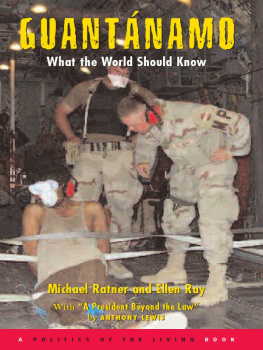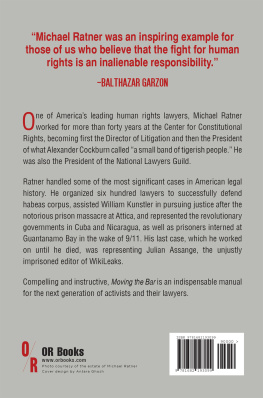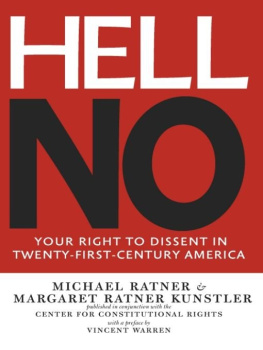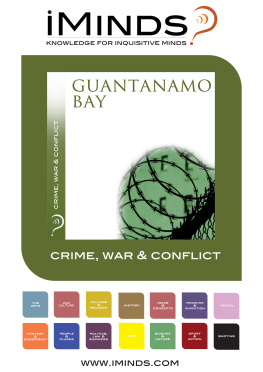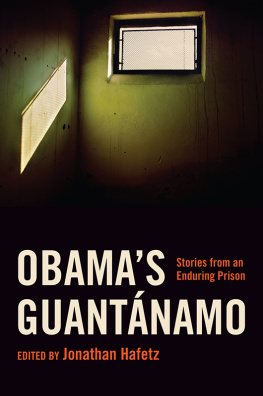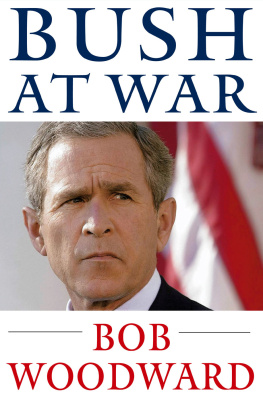
More Advance Praise for
Guantnamo: What the World Should Know
Guantnamo Bay used to be a symbol of liberty or of capitalist recalcitrance, depending on your view of Fidel Castro. Today it is the foremost symbol of American arrogance. The name alone is now sufficient to elicit disbelief, even from our staunchest allies. Michael Ratner is the perfect guide to this strange new world. In a lively, highly accessible conversation with Ellen Ray, he makes the complex simple and the convoluted clear. We come away from our exposure to this noted activist feeling both enlightened and outraged. And we feel one thing more: that it is good to live in a world with a Michael Ratner in it.
William F. Schulz, executive director,
Amnesty International USA
The chasm between constitutional ideal and actual policy that Guantnamo opens up is one more illustration of the capacity for absolute power to corrupt absolutely. Ratner and Ray at least give us the facts we need to solidify our own stand against the Bush administrations neo-medievalism. Feel outraged, then get active.
Dame Anita Roddick, author, activist,
and founder of The Body Shop
From Anthony Lewiss compelling introduction, A President Beyond the Law, through the appendices documenting U.S. Cuban agreements, Guantnamo, with its panorama of prisoner abuse, should be required reading for any American who considers himself a patriot and a defender of human rights.
Rose Styron, poet, journalist, and human rights activist
A brilliant and eloquent indictment of our current administrations disrespect for basic human rights. Ratner breaks down what Guantnamo is, why it matters, and the ramifications for national and international law. This book should be required reading for those concerned with truth, justice, and maintaining our humanity.
Rachel Neumann, rights and liberties editor, AlterNet.org
GUANTNAMO
GUANTNAMO
What the World Should Know
Michael Ratner and Ellen Ray
With A President Beyond the Law by Anthony Lewis
A POLITICS OF THE LIVING BOOK
CHELSEA GREEN PUBLISHING
WHITE RIVER JUNCTION, VERMONT
Copyright 2004 by Michael Ratner and Ellen Ray
All rights reserved. No part of this book may be transmitted in any form by any means without permission in writing from the publisher.
Designed by Peter Holm, Sterling Hill Productions
First printing, June 2004
A President Beyond the Law
by Anthony Lewis copyright 2004 The New York Times Company.
Reprinted by permission.
Printed on acid-free, recycled paper
Library of Congress Cataloging-in-Publication Data
Ratner, Michael, 1943
Guantnamo : What the World Should Know / Michael Ratner and Ellen Ray.
p. cm. (A politics of the living book)
eBook ISBN: 978-1-60358-189-9
1. Prisoners of warLegal status, laws, etc. 2. Combatants and noncombatants (International law) 3. War on Terrorism, 2001Law and legislationUnited States. 4. Military bases, AmericanLaw and legislationCuba. 5. Guantnamo Bay Naval Base (Cuba) 6. Geneva Conventions (1949) I. Ray, Ellen. II. Title. III. Politics of the living.
KZ6495.R38 2004
973.931dc22
2004012395
Chelsea Green Publishing Company
Post Office Box 428
White River Junction, VT 05001
(800) 639-4099
www.chelseagreen.com
Contents
by Anthony Lewis, May 7, 2004
by Ellen Ray
by Michael Ratner
CHAPTER ONE
Guantnamo and Rule by Executive Fiat
CHAPTER TWO
Abuse and Torture
CHAPTER THREE
Guantnamo: Testimony and Case Details
CHAPTER FOUR
Military Commissions and the Supreme Court
APPENDIX ONE
Documents
Lease of Coaling or Naval Stations Agreement
Between the United States and Cuba (1903)
Geneva Convention Relative to the Treatment
of Prisoners of War (III) Article V
Convention Against Torture and Other Cruel, Inhuman or
Degrading Treatment or Punishment (Part I, Articles 116)
Memorandum from Alberto R. Gonzales
to the President (January 25, 2002)
Memorandum from Colin L. Powell to Alberto R. Gonzales
(Counsel to the President) and Assistant to the President for
National Security Affairs Condoleezza Rice
News Transcript from the United States
Department of Defense (February 13, 2004)
White House Fact Sheet
on Status of Detainees at Guantnamo (February 7, 2002)
Letter from Shafiq Rasul and Asif Iqbal to
Members of the Senate Armed Services Committee
Press Release Officials Set Up Review Procedure for
Guantnamo Detainees, American Forces Press Service
Press Release CCR Calls Guantnamo Review Policy
Inadequate and Illegal
T he question tears at all of us, regardless of party or ideology: How could American men and women treat Iraqi prisoners with such crueltyand laugh at their humiliation? We are told that there was a failure of military leadership. Officers in the field were lax. Pentagon officials didnt care. So the worst in human nature was allowed to flourish.
But something much more profound underlies this terrible episode. It is a culture of low regard for the law, of respecting the law only when it is convenient.
Again and again, over these last years, President Bush has made clear his view that law must bend to what he regards as necessity. National security as he defines it trumps our commitments to international law. The Constitution must yield to novel infringements on American freedom.
One clear example is the treatment of the prisoners at Guantnamo Bay, Cuba. The Third Geneva Convention requires that any dispute about a prisoners status be decided by a competent tribunal. American forces provided many such tribunals for prisoners taken in the Persian Gulf War in 1991. But Mr. Bush has refused to comply with the Geneva Convention. He decided that all the Guantnamo prisoners were unlawful combatantsthat is, not regular soldiers but spies, terrorists or the like.
The Supreme Court is now considering whether the prisoners can use American courts to challenge their designation as unlawful. The administrations brief could not be blunter in its argument that the president is the law on this issue: The president, in his capacity as commander in chief, has conclusively determined that the Guantnamo detainees... are not entitled to prisoner-of-war status under the Geneva Convention.
The violation of the Geneva Convention and that refusal to let the courts consider the issue have cost the United States dearly in the world legal communitythe judges and lawyers in societies that, historically, have looked to the United States as the exemplar of a country committed to law. Lord Steyn, a judge on Britains highest court, condemned the administrations position on Guantnamo in an address last fallpointing out that American courts would refuse even to hear claims of torture from prisoners. At the time, the idea of torture at Guantnamo seemed far-fetched to me. After the disclosures of the last 10 days, can we be sure?
Instead of a country committed to law, the United States is now seen as a country that proclaims high legal ideals and then says that they should apply to all others but not to itself. That view has been worsened by the Bush administrations determination that Americans not be subject to the new International Criminal Court, which is supposed to punish genocide and war crimes.
Fear of terrorisma quite understandable fear after 9/11has led to harsh departures from normal legal practice at home. Aliens swept off the streets by the Justice Department as possible terrorists after 9/11 were subjected to physical abuse and humiliation by prison guards, the departments inspector general found. Attorney General John Ashcroft did not apologizea posture that sent a message.
Next page
